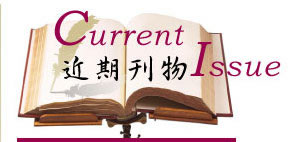 |
||
 |
 |
|
 |
||
CONTENTS |
|
| MOUNTAIN SPIRIT AND HUMAN SPIRIT 山鬼與山人─山居週年記事 By LIAO Chih-yun 廖之韻 Translated by David van der Peet 范德培 |
|
|
SIGNIFICANT OTHER 貴人 By Ching Hsiang-hai 鯨向海 Translated by David van der Peet 范德培 |
|
| SOLEMN ATMOSPHERE 莊嚴氣氛 By Ching Hsiang-hai 鯨向海 Translated by David van der Peet 范德培 |
|
| DIALOGUE 對話 By SEN Kim Soon 辛金順 Translated by David van der Peet 范德培 |
|
| ON DEATH ROW 死囚獄中─死刑者 By WANG Chi-chiang 汪啟疆 Translated by David van der Peet 范德培 |
|
| I BELIEVE 相信 By Hsiang Ming 向明 Translated by John J. S. BALCOM 陶忘機 |
|
| LOST 迷路 By Jiao Tong 焦桐 Translated by David van der Peet 范德培 |
|
| COMPLICATIONS D’AMOUR: LOVE LETTER 愛情併發症─情書 By HSU Shui-fu 許水富 Translated by David van der Peet 范德培 |
|
| TAMSHUI SKETCHES: FISHERMAN’S WHARF 淡水采風─漁人碼頭 By Lo Ti 落蒂 Translated by David van der Peet 范德培 |
|
| A BACKWARD GLANCE AT THE DUSKY STREETS 街影回眸 By LAI Yu-ting 賴鈺婷 Translated by Adela JENG 鄭秀瑕 |
|
| TO COMPREHEND 領悟 By Yin Dih 隱地 Translated by Jonathan YING 殷立仁 |
|
| MIRROR 鏡子 By Yin Dih 隱地 Translated by Jonathan YING 殷立仁 |
|
| WHEN THERE’S NO NEED TO TAKE BETRAYAL SERIOUSLY 當背叛無須沉重以對的時候 By YEN Na 顏訥 Translated by Darryl STERK 石岱崙 |
|
| AFFAIR: WHAT YOU DON’T KNOW 外遇你所不知道的事 By YUAN Chiung-chiung 袁瓊瓊 Translated by Patrick CARR 柯英華 |
|
| MY ROAD TO CERAMICS 我的陶瓷之路 By SUN Chao 孫超 Translated by SUN Yilin 孫逸齡 |
|
NEWS & EVENTS 文化活動 |
|
| PUBLICATIONS BY TAIPEI CHINESE PEN MEMBERS 會員新書 |
|
| NOTES ON AUTHORS AND TRANSLATORS 作者與譯者簡介 |
|
| APPENDIX : CHINESE ORIGINALS 附錄 :中文原著 | |
| 2009 INDEX | |
| FACING MOUNTAINS IN THE DISTANCE, NO. 3 千里碧山對之三, ceramic slab, 138 × 66 cm, 1994........................................................................Cover | |
RETURN FROM PARIS, NO. 6 巴黎歸來系列之六, ceramic slab,
52 × 72 cm, 1990..............Back Cover |
|
LAI Yu-ting 賴鈺婷 A BACKWARD GLANCE AT THE DUSKY translated by Adela JENG 鄭秀瑕
|
||
| All those years I worked in Taipei, I never dropped by Wan
Hua for a casual visit. But on one of my visits with mom back
in Taichung, while we were watching TV to keep each other
company, she piped up casually, “I wonder what the place is like
now?” She was bed-ridden by then, and we saw on the news
how the slightly seedy and dusky traditional market had been
torn down and converted into the bright and tidy “Longshan
Temple Underground Mall,” which was connected to a subway
entrance. Lanterns hung high, drums and cymbals sounded, as
if to chase away the murky atmosphere of the past. “How the times have changed!” You could hear the sadness and helplessness in her voice. The times did seem far ahead of her; the non-stop modernization had turned the landscapes and buildings that used to be so familiar to mom and dad into something like the yesterdays you see in old pictures. Dad had passed on by then, and mom was as frail as a wick that smoldered in the wind. Tiptoeing around her sadness about the rise and fall that occurred as time marched mercilessly on, I raised my voice in an attempt to coax her, “Once you get better, we’ll go back there and shop around the streets just like the mob!” I remember how she pursed her lips, though their corners were slightly raised. The scene is still before my eyes. But mom never got better, and the dream of going back to Wan Hua never materialized. On my way to Longshan Temple by Taipei Metro,1 scenes from the past kept flooding into my mind. I could not help envisioning Wan Hua District, Hua Xi Street, Bao Dou Borough, and many others, that I was about to reconnoiter with my own feet. Names that had been crowded out of my life for years. How different were they now? And how much was I going to be able to recognize by my fallible childhood memory? The Metro got there soon: “Longshan Temple Underground
Mall” on a conspicuous sign. From the entrance where I stood,
I could see the underground mall lit by radiant fluorescent tubes.
Shoppers were few and far between, and a number of shops had
closed down. You could see a soul or two strolling here and there, but on closer look they all appeared to be hobos. |
||
|